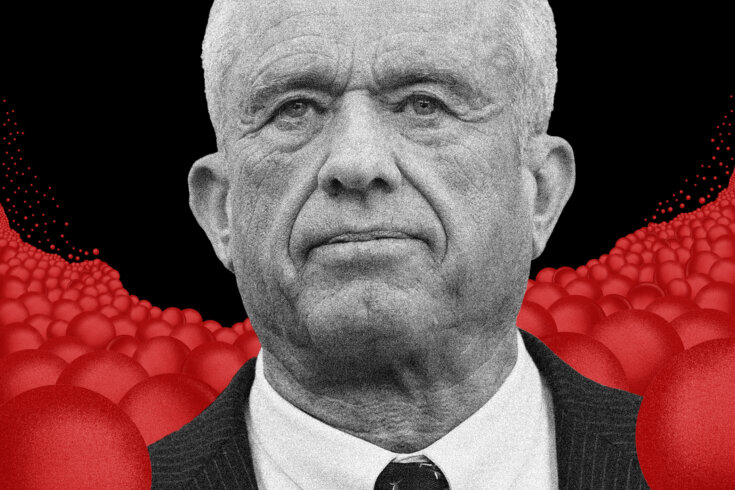It might not be immediately obvious that Robert F. Kennedy Jr., head of the United States Department of Health and Human Services, poses a grave risk to Canadians’ well-being. But the danger is very real.
Scion of one of America’s most storied political families, RFK Jr. began his career as a lawyer with a special interest in environmental causes. But over time, he became something else: a key purveyor of medical misinformation. He has promoted the long-debunked link between vaccines and autism, undermined the scientific consensus on COVID-19, and built a political brand on distrust of the very institutions meant to protect public health. What makes RFK Jr. particularly dangerous isn’t just the content of his claims; it’s his ability to wrap those claims in the language of civil rights, personal freedom, and government accountability. That rhetoric has helped push once-fringe beliefs into the national conversation, with serious consequences.
With RFK Jr.’s ascension to the role of health czar in the second Donald Trump administration, those beliefs are now becoming official policy. Drug approval, food safety, disease monitoring: no part of the infrastructure that keeps Americans healthy is being spared.
Much like Elon Musk’s budget-slashing spree, RFK Jr. has already taken a chainsaw to public health agencies, instituting mass layoffs at the Centers for Disease Control and Prevention (CDC), the Food and Drug Administration (FDA), and the National Institutes of Health (NIH). As Canadian doctors have warned, the fallout from such a decision won’t be limited to the US. Joanne Liu, a well-known pediatric emergency physician in Montreal and former president of Doctors Without Borders, put it bluntly in a recent interview with La Presse: viruses don’t wait for travel visas to spread. Joss Reimer, president of the Canadian Medical Association, echoed the warning, telling the CBC that “misinformation does not respect borders.”
RFK Jr.’s ideas do more than threaten the legacy of public vaccination efforts to control disease in the US. They reflect a broader mindset that undermines global coordination in the face of emerging threats. On day one of his second term, Trump withdrew from the World Health Organization, a move that, given the US role as its top funder, could severely hinder efforts to contain fast-moving threats like avian flu. The CDC’s Epidemic Intelligence Service—its elite corps of so-called disease detectives sent to combat outbreaks like Ebola, Zika, and Legionnaires’—continues to hold its jobs, though for how long is anyone’s guess. Kennedy’s goal is to cut 20,000 positions from Health and Human Services. Roughly 10,000 CDC, FDA, and NIH employees were culled on April 1, including from labs that test antibiotic resistance.
Given how deeply integrated Canada and the US are through trade and travel, any rise in the number of unvaccinated Americans raises the risk of communicable diseases spreading north, even if Canadians continue to steer clear of US vacations. Cuts to the NIH and the FDA could also seriously disrupt cross-border medical research and affect Canadian access to safe medications.
A warning sign of what’s to come: the FDA called off its March meeting of the Vaccines and Related Biological Products Advisory Committee. The panel, where at least one member has openly criticized RFK Jr., was meant to review the upcoming 2025/26 flu season and decide which strains should go into vaccine production. The cancellation comes right after another delay, this time a postponed meeting of scientific advisers to the CDC. Flu vaccine production runs on a tight schedule, and even brief disruptions could leave the US scrambling to roll out doses in time. Again, this is not just an American problem. Canada relies on the US for a significant share of its own supply, anywhere from a third to half each year.
“It’s difficult to predict what the impact will be given how far out some of RFK Jr.’s beliefs are,” said Joel Lexchin, professor emeritus at York University’s School of Health Policy and Management, in an email. Lexchin also worries that a cultural shift at the FDA could spill over into Health Canada, the federal government agency responsible for national health policy. “Health Canada doesn’t automatically accept FDA decisions about how well drugs work or how safe they are, but I don’t have any doubt that FDA decisions are used by Health Canada especially since those FDA decisions are taken about a year before those of Health Canada,” said Lexchin. And given the FDA’s far larger drug oversight budget, added Lexchin, its rulings inevitably carry weight.
The first recorded US measles death in about a decade earned a blithe dismissal from RFK Jr., who responded to legitimate concerns of a growing crisis by saying that outbreaks occur every year. What he didn’t mention is that in the year 2000, measles had been eradicated in the US, thanks to vaccination. It is precisely because of anti-vaccine crusaders like RFK Jr. that the disease has not only been resurrected in the country but is once again killing Americans. As of this writing, there have been three deaths, including two children, and nearly 500 have been infected in Texas, Oklahoma, and New Mexico. As the outbreak expands across the country, Kennedy has made baffling, false, and unfathomable claims, including a suggestion that getting measles would offer better protection than the vaccine. Kennedy further made unsubstantiated claims that the MMR—measles, mumps, and rubella—vaccine harmed children, and that poor diet and health were responsible for the measles outbreak in West Texas.
Canada, too, had effectively stamped out measles, but like in the US, that success is proving fragile. Measles was recorded as having been eradicated here in 1998, due to successful vaccination efforts. The disease requires a vaccination rate of 95 percent to maintain community immunity; as of 2023, only 82.5 percent of two-year-olds had multiple doses of the MMR vaccine, according to data from four provinces and one territory. The most serious recent declines in MMR vaccination occurred in 2021 and 2022—the middle stretch of the COVID-19 pandemic and, broadly, the period in which public opposition to public health measures was at its highest in Canada. Such data suggests that forms of conspiratorial thinking stoked by the first Trump administration are also having an influence on Canadians.
This is not to absolve Canadians of their responsibility: ultimately, we are responsible for electing governments that have hacked health care funding to the bone. Ontario had the lowest health spending in Canada in 2022, and Quebec has cut 1,000 health care positions. This year, according to the Canadian Press, Alberta attempted to slash $400 million in physicians’ fees—a move that will likely end up in arbitration. None of these examples are accidents: Canadians have been subjected to intense anti-regulation campaigns from libertarian think tanks partially funded by American organizations.
Leading the charge is the Fraser Institute, which routinely campaigns against Medicare with deceptive arguments about whether cost is disproportionate to its effectiveness (ultimately arguing for increased reliance on privatized health care). The institute has received millions in funding from American pharmaceutical giants. The same can be said of the Macdonald-Laurier Institute, which similarly works to undermine public health care in Canada. The MLI is affiliated with the Fraser Institute, the Montreal Economic Institute, the Canadian Taxpayers Federation, and other anti-regulation groups through the Atlas Network, partially funded by the Koch family—a global effort to defund the social safety net, couched in the language of “individual liberty” and “a life of choice.”
Canada is heavily dependent on a well-functioning American ecosystem of health care–related government agencies that conduct medical research, study infectious diseases, and—perhaps most importantly—determine whether pharmaceuticals are fit for human consumption. But because of free trade, Canadian pharmaceutical and medical supply chains run south–north—far more than was ever the case in the era before free trade agreements—and this has made Canada even more vulnerable. As the first Trump administration tried to get a handle on the COVID-19 pandemic, Trump personally intervened to halt the shipment of personal protective equipment to Canada. And despite once having a publicly owned vaccine producer and what was once a dynamic domestic pharmaceutical sector, Canada found itself trying to outbid other nations for vaccine supplies.
Almost nothing has changed since. Jim Stanford, economist and director for the Centre for Future Work, reminds that promises of major investments in pharmaceutical research and development were never fully realized. The federal government seemingly made some progress in buttressing Canada’s defences against a future global pandemic by spending $100 million to develop a vaccine plant in Montreal, but a recent CTV segment reveals that facility hasn’t produced any vaccines in the four years it’s been open. In an interview with the network, Raywat Deonandan of the University of Ottawa explained that the facility not only has the potential to produce vaccines and antibodies that would help Canada become less dependent on the US but, by doing so, Canada could also become a global vaccine policy leader.
While free trade hasn’t prevented Canada from producing its own vaccines or other pharmaceuticals, it has made it difficult to maintain a dynamic, domestic, and autonomous industry that can serve our national interests. That’s because Canada’s trade agreements don’t just shape markets—they shape our ability to govern.
Stuart Trew of the Canadian Centre for Policy Alternatives argues these deals have “compromised our ability to expand public services including health care” because of tough enforcement mechanisms that mean even well-intentioned policies can trigger trade or investor disputes. During the 2017/18 CUSMA—the Canada–United States–Mexico Agreement—negotiations, Canada agreed to American demands that we extend pharmaceutical patents, an effort that would further constrain Canadian manufacturers from developing inexpensive domestic generics, as they could legally make generics only once the patent rights expired in our jurisdiction.
Trew believes that the confirmation of RFK Jr. and Trump’s coercive, go-it-alone approach to trade could introduce new risks for Canada’s health care system. “The Trudeau government saw the first Trump administration’s deregulatory agenda as an opportunity to push for more business-friendly regulatory alignment in areas like meat inspection, toxic chemicals, rail safety and nuclear reactor design, all to smooth trade across the border,” said Trew in an email to The Walrus. “Will Canada be open to more of the same lowering of public protections in coordination with the anti-science Trump team? You would hope not, but who knows what this government will agree to under the pressure of Trump’s tariff threats.”
If the first few months of the new Trump administration provide any insight into what may come, the odds of pharmaceutical supply chains breaking down because of ill-preparedness, problems related to testing and evaluation, or because critical staff were cut all seem about equal. The administration’s chronic inconsistency is illustrated by numerous examples of mass firings followed by frantic rehiring efforts, as much as by RFK Jr. reversing course despite his well-known anti-vaccine rhetoric and now pleading with families to have their children inoculated against measles.
“Trump’s attacks on Canada are a wake-up call: we need to move quickly to rebuild our once-world-leading capacity to develop and produce drugs and enhance our economy’s ability to meet Canadians’ basic needs without dependence on erratic foreign authoritarians,” said Stanford.
Free trade may seem like a good idea in theory. But weakened by decades of chronic underfunding and the decline of a domestic pharmaceutical industry, health care in Canada faces its greatest test against America’s greatest cultural export: unmitigated, unapologetic, state-sanctioned ignorance.




